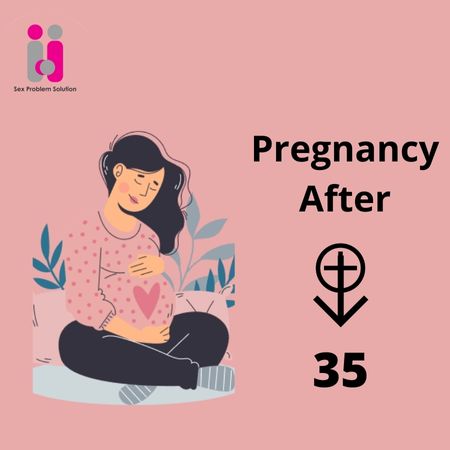Sex Problems, Sexual Problems
A Guide to Pregnancy After 35 – Sex Problem Solution
Pregnancy after 35 often happens after years or even decades of trying. While many women can conceive on their first attempt, it’s a normal part of the aging process thanks to the biological and hormonal changes of pregnancy. This will help you determine if you are older than 35 (or beyond) when you should begin trying, and how much time it could take to become pregnant
What does the process take in terms of time, effort, and planning?
1. The first step is when you want to try. Many women determine their pregnancy plans around their careers and finances, but also around their family size, as well as their physical and mental health.
2. The second step is to plan for a healthy pregnancy. Studies show that women over 35 have more complications during pregnancy, so it’s a good idea to prepare your body for the extra effort of carrying a child by improving your health, exercise, and even fertility habits.
3. The third step is trying to conceive. You can take fertility medications or just try naturally. During this time, it’s important to be mindful of how quickly you’re able to conceive. If it’s taking you longer than expected, don’t worry—you need to collect data on yourself over time before you can decide whether or not you should seek out help from an infertility specialist. Even if you are older than 35 right now, it doesn’t mean you won’t be able to conceive in the future!
Takeaway: Pregnancy after 35 is known for its challenges, but with proper planning and preparation, it’s possible to have a healthy pregnancy regardless
Pregnancy after 35 is possible, just be sure to make the right choices
Pregnancy after 35 is possible, but it’s not easy or automatic. While some women may be able to conceive on their first attempt, it doesn’t happen for everyone. If you are past the age of 35 and want to become pregnant sooner than later, read these facts about pregnancy in your 40s, then follow this advice as closely as possible
Use a fertility specialist
With the help of a fertility specialist, you are taking your next step towards building a family. The specialist will be able to give you Kottakkal Dashmularishta, Dhootapapeshwar Pushpadhanwa rasa, and Organic India Shatavari which Help you the highest quality care and help you to reach your goal of getting pregnant faster. If you’re looking for one, then Sex Problem Solution is a good Choice. We have got some helpful tips for you that will help you to reach your goal
Conclusion
If you are in your mid-to-late-30s without a child, you might be wondering how old is too old for pregnancy. Thankfully, we put together some tips for pregnant after 35 and beyond Not Át give up hope – bringing a new life into the world is possible at any age
Disclaimer – The information provided, is for general awareness only. You must and should consult your physician before consuming the same
FAQs (Frequently Asked Questions)
Q1. Is it safe to have a baby after the age of 35?
Pregnancy after 35 can be safe with proper medical care and lifestyle choices. However, there may be increased risks that should be discussed with a healthcare provider.
Q2. How does age affect fertility?
Fertility typically declines with age, with a more significant decline after 35. It may take longer to conceive, and the risk of certain fertility issues increases.
Q3. Are there benefits to having a baby later in life?
Yes, some benefits include emotional readiness, financial stability, and career advancement.
Q4. What medical tests are recommended during pregnancy after 35?
Common tests include genetic screenings, amniocentesis, and more frequent monitoring of the pregnancy.
Q5. How can I balance my career with motherhood as an older mom?
Balancing career and motherhood may require effective time management, support from employers, and flexible work arrangements. Planning ahead is essential.
Pregnancy after 35 is a unique journey that can be both fulfilling and challenging. With the right knowledge, support, and preparation, women can embrace motherhood at any age and cherish the joys it brings.

